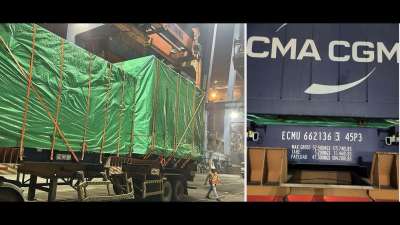Pakistan has denied that a Karachi-bound ship seized by Indian forces in Mumbai was carrying nuclear project machinery. The Pakistan Foreign Office claims the reports of the seizure contained “misrepresentation of facts.” The DRDO team evaluated the shipment, which included a Computer Numerical Control (CNC) machine, and confirmed its possible use in Pakistan’s nuclear development. The Pakistan Foreign Office has informed PTI about the situation.

Pakistan’s Foreign Ministry denied allegations of a Karachi-based firm importing a commercial lathe machine for the country’s automobile industry. The statement stated that the transaction was conducted through transparent banking channels and all relevant documentation, indicating that the equipment was purely for commercial use. The incident highlights the country’s stance on commercial transactions.
Pakistan objects to India seizing the ship
Pakistan condemned India’s action on a ship from China headed for Karachi on Sunday, citing suspicions that it was carrying a “consignment for the nuclear program.”
Pakistan stated that the shipment was a “simple case” of the import of a commercial lathe machine by a business company that sells parts to the country’s car sector, despite calling the operation a “unjustified seizure” of commercial items bound for Karachi.

According to Pakistan’s Foreign Office, the cargo shipment is a straightforward instance of a commercial lathe machine being imported for the country’s automotive sector by a business organization with its headquarters in Karachi. Pakistan responded when security personnel at Mumbai’s Nhava Sheva port stopped and confiscated a shipment of a ship headed for Karachi from China.
It was discovered by the security services to be a dual-use cargo with consequences for Pakistan’s ballistic missile and nuclear programs. Pakistan denounces India’s arbitrary move of seizing commercial products, the foreign official said, labelling India’s actions as “unjustified.” The difficulties associated with governments with questionable qualifications arbitrarily assuming police duties are highlighted by this interruption of free commerce.
Why was China Ship Stopped at Mumbai Port?
The CMA CGM Attila, a Malta-flagged merchant ship, was stopped by customs officials after receiving intelligence input. The ship was inspected for a Computer Numerical Control (CNC) machine, originally manufactured by an Italian company. The DRDO team certified the equipment for use by Pakistan for its nuclear program, as it would be useful in manufacturing critical parts for Pakistan’s missile development program. The shipment was stopped due to the efficiency and accuracy of CNC machines.

The Wassenaar Arrangement, an international regime established in 1996, aims to prevent the spread of equipment with both civilian and military applications.
India, one of 42 participating countries, has been involved in exchanging information about the transfer of conventional weapons and dual-use goods and technologies. However, a CNC machine used by North Korea in its nuclear program was seized by Indian defense authorities after being inspected by port officials.
The seizure falls under the prevention of possible proliferation by Pakistan and China. The consignment was seized by Shanghai JXE Global Logistics Co Ltd and Pakistan Wings Pvt Ltd. Security agencies have discovered that a consignment, weighing 22,180 kilograms, was shipped by Taiyuan Mining Import and Export Co Ltd for Cosmos Engineering in Pakistan.
Pakistan calls it “unjustified”
Pakistan has protested India’s seizure of a Karachi-bound ship from China, claiming it was a “simple case” of the import of a commercial lathe machine by a Karachi-based commercial entity for Pakistan’s automobile industry. The Foreign Office clarified that the consignment was a dual-use consignment with implications for Pakistan’s nuclear and ballistic missile programs. The Foreign Office argued that the action was an “unjustified seizure” of commercial goods destined for Karachi. The incident occurred at Mumbai’s Nhava Sheva port.

The foreign official criticized India’s arbitrary assumption of policing roles and the growing impunity of certain states in violating international norms. The ship was found to have a Computer Numerical Control (CNC) machine, manufactured by an Italian company, which falls under the Wassenaar Arrangement, an international arms control regime.
Despite India’s active participation in the Wassenaar Arrangement, Pakistan clarified that the ship was importing a commercial lathe machine by a Karachi-based commercial entity, indicating its pure commercial use.
The seizure of commercial goods highlights the dangers of arbitrary policing by states with dubious credentials.











